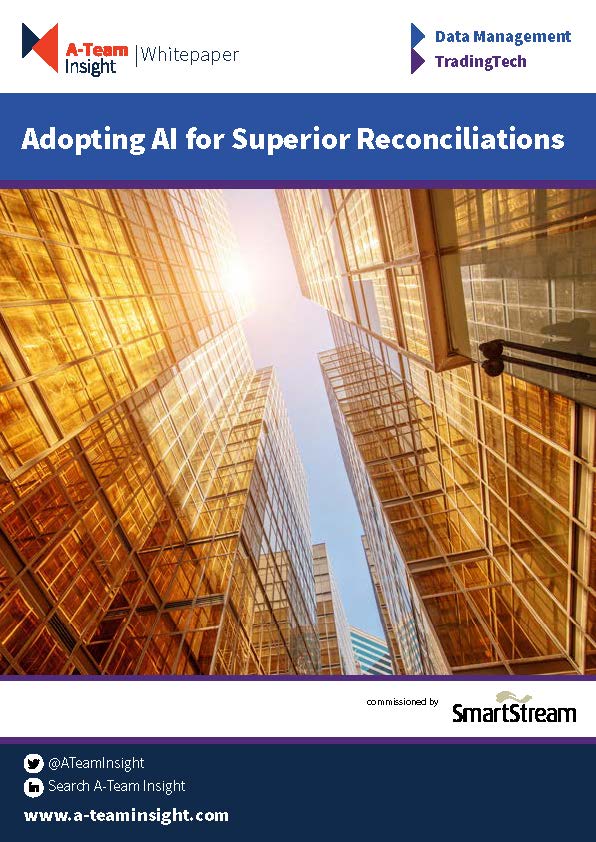

IN ASSOCIATION WITH SMARTSTREAM
Whether it is familiar through movies, books, conferences or real-world applications, we are all acquainted with the concept of artificial intelligence in one form or another. Like any other industry, the financial services sector abounds with talk of artificial intelligence and machine learning. Unlike many others, however, it has been slow to find meaningful applications.
Judging by the response to systems launched by financial software and managed service company SmartStream at the recent Sibos conference in London, however, that wait may now have ended. Future Banking speaks to head of innovation at SmartStream, Andreas Burner about how the company’s work in reconciliation is changing that forever.
“Our goal is to make the most efficient use of AI and ML, and help banks to save on operational costs,” says Burner. “At the moment, everyone is talking about how AI might work, but banks have the problem of not understanding where to apply it. They want to know how to get return on investment (ROI) from the combination of customer data, reconciliation data, trade finance data and all of the other sources of information they have,” he says.
“For us, it is very easy to understand where our clients can get ROI. They must focus on those areas where they have the biggest amount of staff working on data, as well as the biggest volume of data. That is the reconciliation function.”
How well do you really know your competitors?
Access the most comprehensive Company Profiles on the market, powered by GlobalData. Save hours of research. Gain competitive edge.

Thank you!
Your download email will arrive shortly
Not ready to buy yet? Download a free sample
We are confident about the unique quality of our Company Profiles. However, we want you to make the most beneficial decision for your business, so we offer a free sample that you can download by submitting the below form
By GlobalDataOne SmartStream application that drew large crowds at Sibos was its AI reconciliations (AIR) service. The system is designed to take the hassle out of the reconciliation process by allowing banks to hand over many of the laborious data-management tasks to software not only powered by ML algorithms, but safely and expediently hosted in the cloud.
The solution requires no training, and allows its user to input any structured data using a simple interface to run the reconciliation process. The algorithms underlying the software assume the burden of defining the rules by which the data needs to be matched, before performing the matching function. In just a few seconds, the results are delivered back to the user.
“We have another solution – the approach known as Transaction Lifecycle Management, or more widely know as TLM Reconciliations – that improves matching processes at banks that have thousands of exceptions every day that are being matched by hand,” says Burner. “That system can resolve 80% of those exceptions, saving hours or even days. With AIR, we are focusing on areas where banks don’t have anything in place.
“For example, in the trade-finance or equities domain, where hundreds of data formats are used and no universal reconciliation systems existed. With AIR, you simply upload the file and the reconciliation is done in seconds. Usually, it would take three to five weeks to set up the data and the system. With AIR, everything is recognised and reconciled automatically.”
The fruits of hard labour
The development of AIR has been a long and hard process, drawing on the diverse minds that SmartStream has at its disposal. Calling on data scientists and industry experts, as well as its experience in delivering a range of solutions – in areas such as cash and liquidity management, collateral management and corporate actions processing – the company factored in AI to work on reconciliation and steadily learned where it could deliver the most value.
“It was a real challenge to create,” admits Burner. “At first, it took 20 minutes for the system to understand and reconcile a data set, but we know that users won’t wait more than 10 to 20 seconds. We also needed the right user interface, so that the system would be intuitive and easy to use.
“In the end, we boosted the performance by using several AIs,” he says. “One looks at the data and selects some significant examples. The second one starts processing the data, but it only uses a subset as an example to configure it in the right way and establish the rules for reconciliation. Then the third one applies those rules to the whole data set.”
The result of the team’s hard work is a solution that is like no other. While some banks have been using AI to improve data quality, the results delivered by AIR take the use of the technology to a new level.
The response from banks clearly shows a great appetite in the industry for improvements in reconciliation. More broadly, it shows the industry is ripe for the use of AI, not for its own sake, but in those applications where it can truly transform a process and create a new paradigm.
Stay ahead of the AI curve
Towards the end of 2018, industry research company Gartner did extensive research into the future of AI, and its results were not encouraging. It predicted that by 2022, 85% of AI projects still would not deliver the results that CIOs expect. In other words, only three out of every 20 AI projects will succeed.
That high level of failure is not, according to the research, because of any problems with the technology. The problem, Gartner predicts, will be with ROI. For Burner, this is partly because AI projects developed in-house require a clear focus, an understanding of the data and the domain, regulatory requirements, and high-level data scientists.
“We have a product that clearly improves matching rates,” Burner says. “AIR is on the cloud, so it has no hidden costs. It has a very easy business case – much easier than employing 300 data scientists – and it helps to optimise a complicated and time-consuming process. There is no implementation, no integration and no hardware. It sits in the cloud and the AI does the configuration of the data – it’s win-win.”
But SmartStream has deployed AIR with five banks – two in the US, two in the UK and one in Singapore – who are already seeing a strong ROI.
As Burner explains, AI is not a key part of its offering because it wants to be tied to the latest buzzword in financial technology. Instead, it is only by using ML algorithms in those precise points where their key functionality – defining and following a clear set of process rules – that a real difference in performance compared with older systems can be clearly demonstrated.
In the face of Gartner’s predictions, the fact that AIR is already using ML algorithms to great effect – and can deliver clear ROI from transforming a complex and messy process – means that it will play a key role in opening up the industry to the potential AI holds to transform the financial services industry.
For SmartStream, AIR sets the scene for the AI journey, and it is not a company that rests on its laurels. The next big challenge is unstructured data. When it can interpret and reconcile the data in emails, PDFs, invoices and other unstructured formats, AI will change the rules of the game once again. With SmartStream already running promising prototypes, we may not have to wait too long.
Adopting AI for Superior Reconciliations
In these challenging times, more industries have begun to embrace digitalisation as a solution to working productively and remotely. The financial services industry is no different, and adopting these innovative technologies will not only meet the demands for fast and seamless service, but also pre-empt future challenges.
AI and cloud technology are fundamental elements of digitalisation. SmartStream efficiently applies these technologies to deliver tangible benefits and better outcomes for customers, drawing on the expertise of an Innovation Lab that has been working on AI and cloud technology for years. Using SmartStream, cloud software is available in minutes, and AI can quickly and efficiently adapt workflows.
This whitepaper elaborates on what the financial services industry can gain from embracing AI, and how the technology is ready for the future.

By clicking the “Submit” button above, you accept the Terms & Conditions and acknowledge that your data will be used as described in the SmartStream Privacy Policy
We will also collect and use the information you provide for carefully considered and specific purposes, where we believe we have a legitimate interest in doing so, for example to send you communications about similar products and services we offer. We will always give you an option to opt out of any future communications from us. You can find out more about our legitimate interest activity in our privacy policy here. ‘We’ includes Verdict Media Limited and other GlobalData brands as detailed here.







